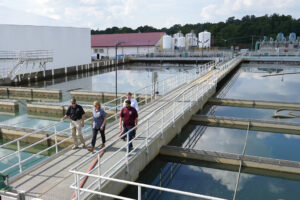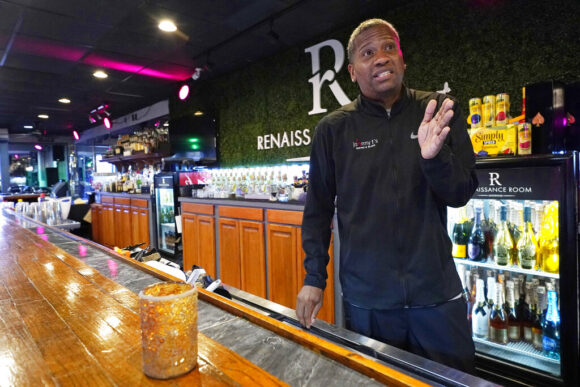As they learned with the COVID-19 pandemic shutdown, establishments that lost water service in troubled Jackson, Mississippi, this month are finding that their business interruption insurance policies won’t always help pay for lost customers and lost revenue.
“Most coverage is being denied, from what I understand,” said Pat Fontaine, executive director of the Mississippi Hospitality & Restaurant Association.
Restaurants in the state’s capital city have said they’ve had to close their doors temporarily or spend hundreds or even thousands of dollars per day to provide bottled water, ice, portable restrooms and other emergency measures, even as customers have slowed to a trickle during the crisis. The water problems have only compounded restaurants’ existing woes, including labor shortages, supply-chain issues and inflation that has raised the price of supplies and dishes served to patrons, Fontaine said.
Relentless rains caused the nearby Pearl River to flood part of the city Aug. 29. While not widespread, the muddy water exacerbated longstanding problems with one of Jackson’s two water treatment plants, shutting down service to most of the population of 160,000, officials said.
Water pressure was restored to much of the area by Tuesday, Sept. 6, but residents and businesses remained under a boil-water notice for the foreseeable future, according to news reports.
The water woes have hit the food service industry especially hard. Derek Emerson, co-owner of one of Jackson’s oldest and best-known restaurants, Walker’s Drive in, told a local TV station that the water problems “are making it impossible for us to do business in Jackson, Mississippi.”
Others stayed open, but with fewer patrons.
“The numbers are very low for lunch,” John Tierre, owner of Johnny T’s Bistro and Blues, told The Associated Press. “They’re probably taking their business to the outskirts where they don’t have water woes.”

Another entrepreneur, Bobbie Fairley, owns Magic Hands Hair Design on the city’s south side.
She canceled five appointments one day last week because she needs high water pressure to rinse her clients’ hair of treatment chemicals. She also has had to purchase water to shampoo hair to try fit and in whatever appointments she can. When customers aren’t coming in, she’s losing money.
“That’s a big burden,” she told the AP. “I can’t afford that. I can’t afford that at all.”
Despite the purchase of business interruption insurance, many business owners are finding that their policies have left them under water.
The Mississippi Insurance Department reported that it has had a few inquiries from businesses about the issue, and has determined that most policies won’t cover the losses. As courts across the country have decided in COVID-shutdown cases, most business interruption policies have been construed to require direct, physical damage to the premises.
“For business interruption to be covered, it must be due to a covered cause of loss,” the Mississippi Insurance Department’s consumer services director, Andy Case, said in a statement. “Under a commercial business policy, that means there must be physical damage to the business from a covered cause of loss.”
Case noted that in most COVID-caused business interruption cases, it was determined that there was no physical damage to the businesses from the shutdown.
“And in the case of our water crisis, there is no physical damage to these businesses/buildings,” he said.
Some policies carry endorsements that address loss of utilities, but most of those also require physical damage to the utility company’s property from a covered peril, such as a storm. Flooding is not usually covered, said Timothy McClendon, a Texas-based insurance expert who has been in the business since 1972.
Fontaine said that some Jackson business see a glimmer of hope there – that state and federal investigations into the water fiasco will find that the rain storm that led to the river flooding may be considered a cause of physical damage to the utility.
News reports have indicated that Jackson’s water problems have been building for more than two decades. The city has seen its share of white flight to the suburbs, and city officials have said Jackson doesn’t have the tax base to afford a billion-dollar system upgrade. A lack of funding through the years has hampered maintenance and repairs.
That’s bad news for Jackson business establishments hoping for insurance relief. Most utility-loss endorsements specifically exclude losses “due to maintenance, deterioration and neglect (all of which are well documented as the source of the water problems in Jackson),” said Case, the consumer services official.
Filing suit against insurers that have denied claims may bring little remedy, if COVID-claims litigation is any indication. A University of Pennsylvania School of Law tracking service shows that of hundreds of COVID-related business interruption suits around the country, almost 87% have been dismissed. Most of the cases have been sunk because policies carried virus exclusions or have been interpreted to mean that physical loss to the property is required for coverage to kick in. Courts have said that viruses, in most instances, do not damage the premises.
The legal thinking may be evolving, though. A Texas jury this week awarded Baylor College of Medicine almost $49 million in damages after the college had to cut back operations during the pandemic. Baylor held an all-risk policy, with no virus exclusion, from Lloyd’s of London.
A paper soon to be published in the law journal “Tort, Trial & Insurance Practice” argues that for decades, insurance policies considered “physical loss” to be distinct from physical damage, and could include the loss of use of the property due to contamination. Many recent COVID court rulings have misunderstood that, according to the paper’s authors, one of whom is Charles Miller, an attorney with the Insurance Law Center, in California.
Related: Infrastructure Crisis in Southern Cities Could Mean New Opps for Insurers
So, unless business interruption policies contain a virus or pandemic exclusion, they “must be construed to provide coverage,” the attorneys wrote. Perhaps the same argument could be applied to Jackson restaurants’ business policies that don’t contain a specific exclusion for loss of water service.
It’s possible that a few Jackson establishments will now consider that and sue their insurers. But Fontaine said it’s more likely that some will sue another potential defendant, one that may have contributed directly to the water service shutdown.
“There has been some discussion about suing the city of Jackson, to help recoup some of the losses,” he said.
Top photo: John Tierre, owner of Johnny T’s Bistro and Blues, in Jackson, Miss., said many customers have disappeared while the city was without water service. (AP Photo/Rogelio V. Solis)
Was this article valuable?
Here are more articles you may enjoy.



 Jury Awards $80M to 3 Former Zurich NA Employees for Wrongful Termination
Jury Awards $80M to 3 Former Zurich NA Employees for Wrongful Termination  Progressive Gains as Drivers Shop Around for Auto Insurance—Again
Progressive Gains as Drivers Shop Around for Auto Insurance—Again  Uncertainty Keeps Prices Up; No Prior-Year Loss Development: Travelers
Uncertainty Keeps Prices Up; No Prior-Year Loss Development: Travelers  Trump’s Bond Insurer Tells Judge Shortfall Is ‘Inconceivable’
Trump’s Bond Insurer Tells Judge Shortfall Is ‘Inconceivable’ 


